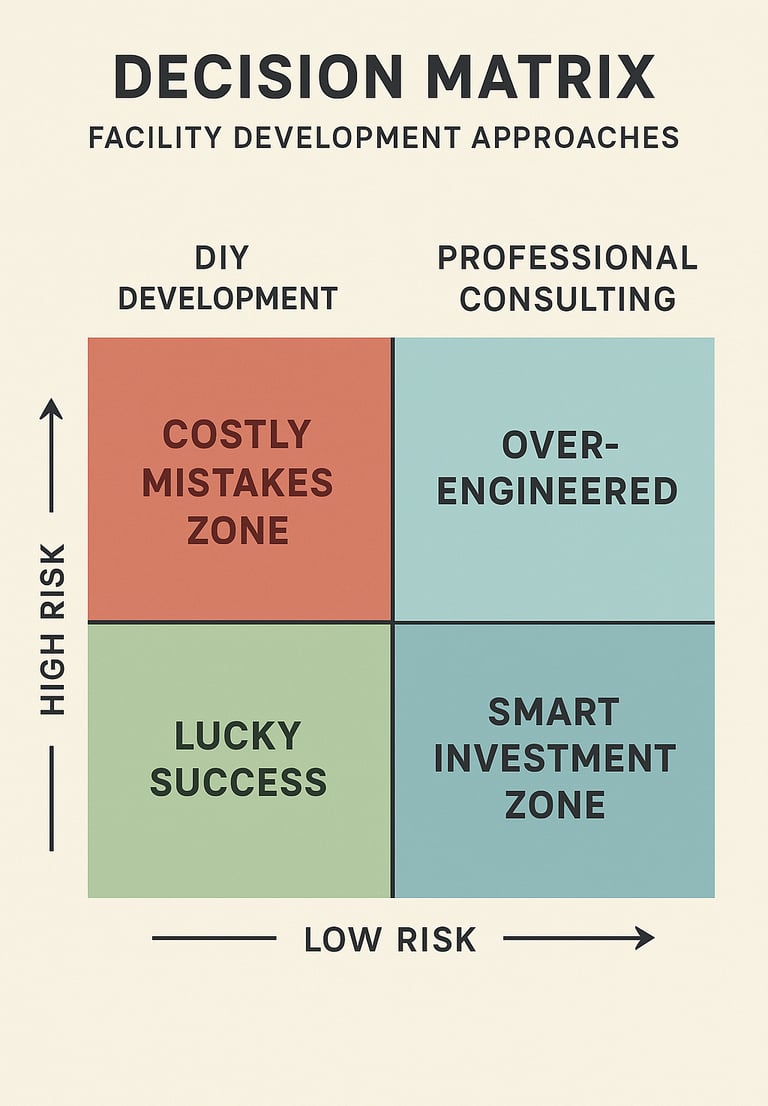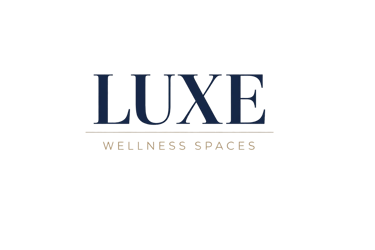Spa Consultant Benefits: Strategic Investment for Wellness
Discover why hiring a spa consultant prevents costly mistakes and drives profitability. Expert guidance for hotel operators and spa owners ready to succeed.
Daryn Berriman
11/18/202510 min read
You wouldn't build a hotel without an architect or launch a restaurant without a chef. Yet wellness facility owners routinely invest millions without professional spa consulting, then watch profits drain through operational gaps they didn't know existed.
What a Spa Consultant Actually Does
A spa consultant is a specialized advisor who designs, optimizes, and operationalizes wellness facilities to maximize guest satisfaction and financial performance. They bridge the gap between beautiful concepts and profitable realities by applying proven systems for design, operations, staffing, and revenue management. According to the Global Wellness Institute, the wellness economy reached $5.6 trillion in 2024, underscoring the need for expert guidance in this competitive, high-stakes market.
Why Professional Guidance Matters More Than Ever
Consider Lisa, who opened a boutique day spa without professional guidance. She invested heavily in beautiful interiors but overlooked treatment room acoustics, staff workflow efficiency, and revenue management systems. Within eighteen months, high operating costs and inconsistent guest experiences nearly closed her doors. A spa consultant identified twelve operational inefficiencies quietly draining profits.
The wellness industry grew 12.8% from 2022 to 2024, outpacing global economic growth nearly three times over (Global Wellness Institute, 2024). This boom attracts competition, but only facilities with strategic operations and genuine guest experiences survive. The 2025 spa trends include hyper-personalized wellness, VR meditation, and eco-conscious retreats, requiring expertise that extends far beyond installing massage tables.
Market Positioning That Captures Your Ideal Client
The wellness industry is crowded. Expert spa consultants analyze local market conditions, competitor offerings, and demographic trends to identify profitable niches. They know that 70% of medical spa clients have annual incomes exceeding $75,000 (Brenton Way, 2025), but capturing this demographic requires strategic positioning, not just premium pricing.
A spa business consultant evaluates your competitive landscape and creates differentiation strategies that attract guests willing to pay for excellence. They understand which services command premium pricing in your specific market and which are commoditized.
Revenue Architecture That Maximizes Every Guest
Professional consultants bring sophisticated revenue management expertise. They understand service pricing psychology, package structuring, retail integration, and membership models that boost profitability while maintaining satisfaction.
Take Michael's luxury resort spa. His treatments were priced based on competitor research, but utilization remained disappointingly low. A spa consultant restructured his service menu, introduced strategic packages, and redesigned the booking flow. Revenue per guest increased 40% within six months while satisfaction scores improved.
This isn't guesswork. Spa operations consultants use data-driven models that account for treatment duration, therapist utilization rates, retail attachment, and seasonal fluctuations. They design revenue systems that work with your facility's unique constraints.
Operational Systems That Function Seamlessly
Expert wellness consultants understand the intricate mechanics of spa operations. They design treatment room layouts that minimize therapist fatigue, create reception areas that manage guest flow smoothly, and establish back-of-house systems that keep everything running without drama.
Your team becomes your brand's most important asset when consultants develop comprehensive training programs ensuring consistent service delivery, career advancement pathways reducing turnover, and performance management systems maintaining high standards.
Design Intelligence: Function Meets Experience
Creating Spaces That Work Hard
Spa design consultants understand how to create stunning, highly functional spaces. They know which materials withstand constant humidity, how to design treatment rooms accommodating different service types, and how to create retail areas generating significant revenue without feeling pushy.
The science behind wellness design matters. Effective spa environments physiologically promote relaxation and healing. Expert consultants understand how lighting temperature, sound frequencies, air circulation, and spatial flow directly impact guest well-being and staff productivity.
Sensory Journey Engineering
Professional wellness space designers create carefully orchestrated sensory experiences. From entry to exit, every element works together: lighting transitions, sound design, scent distribution, and tactile experiences create transformative moments that guests return for and recommend.
Health trends for hospitality in 2025/26 include digital detox offers, organic and vegan menus, non-toxic sustainable cosmetics, and special amenities for optimized sleep (ADA Cosmetics, 2025). Expert consultants integrate these trends authentically into your facility's design and service offerings without gimmicks.
Technology Integration That Actually Enhances Experience
Modern spas require sophisticated systems for booking, client management, inventory control, and performance tracking. Consultants select and integrate platforms that work together efficiently, avoiding the expensive mistake of cobbling together incompatible technology.
The digital age brings virtual wellness to the forefront. Offering online consultations, virtual classes, or digital wellness content expands your reach and provides flexible client options. Expert consultants know how to integrate emerging technologies without compromising your core spa experience.
Modern guests expect highly personalized experiences. Professional consultants create systems that remember preferences, track treatment histories, and deliver customized experiences that feel genuinely personal rather than mechanically programmed.
Financial Performance and Long-Term Sustainability
Experienced consultants prevent costly mistakes during development and ongoing operations. They know which investments provide genuine returns and which are expensive distractions. Their guidance typically saves clients far more than their consulting fees.
Professional consultants establish key performance indicators and monitoring systems, providing real-time insights into your facility's health. They know which metrics actually matter and how to use data to drive continuous improvement.
Expert consultants don't just help you open successfully. They plan for long-term sustainability, anticipate market changes, plan for equipment replacement cycles, and create systems that adapt as your business grows.
The Costly Mistakes Most Spa Owners Make
Underestimating operational complexity ranks as the number one failure point. Beautiful treatment rooms mean nothing if your booking system frustrates guests, your therapists lack proper training, or your pricing structure doesn't cover actual costs.
Regulatory disasters sink facilities regularly. Spa regulations vary significantly by location and service type. Professional consultants navigate complex licensing requirements, health department regulations, and insurance considerations protecting your investment and ensuring smooth operations. One missed permit can delay opening by months and cost tens of thousands in holding costs.
Equipment purchasing errors drain budgets fast. The spa equipment market overflows with beautiful but impractical options. Expert consultants know which brands offer genuine value, which suppliers provide reliable service, and how to negotiate contracts protecting your interests. That $15,000 hydrotherapy tub might look stunning in the showroom but could require $3,000 annual maintenance you didn't budget for.
Staffing structure failures create ongoing operational chaos. Many spa failures stem from poor staffing decisions and inadequate management systems. Consultants help establish organizational structures, compensation plans, and management systems that attract quality team members and maintain high service standards. Turnover costs the average spa 30-50% of an employee's annual salary in recruitment and training expenses.




How Spa Consulting Compares to DIY Approaches
DIY Spa Development:
Reliance on vendor recommendations (often biased toward their products)
Trial-and-error operations costing thousands in lost revenue
Generic design copied from competitors
Reactive problem-solving after issues emerge
No industry benchmarking for performance
Equipment purchases based on aesthetics rather than ROI
Compliance gaps discovered during inspections
Professional Spa Consultant Approach:
Independent, unbiased guidance focused on your success
Proven operational systems implemented from day one
Strategic differentiation creating competitive advantage
Proactive planning preventing expensive mistakes
Performance metrics benchmarked against industry leaders
Equipment selection based on durability, maintenance costs, and guest impact
Compliance roadmap completed before construction begins
Versus General Business Consultants:
Spa and wellness facilities have unique requirements that general business advisors can't address. A wellness consultant understands treatment room requirements, therapist certification standards, wellness product inventory management, and guest journey psychology specific to healing environments.
Versus Architects or Interior Designers:
While architects and designers create beautiful spaces, they typically lack operational expertise. A spa operations consultant ensures your gorgeous facility actually functions efficiently for staff and guests. They know that a stunning waterfall feature means nothing if the sound interferes with meditation classes.
The Counter-Intuitive Truth About Spa Consulting
Experienced hotel operators and resort developers often skip spa consulting because they've successfully built other hospitality ventures. They assume wellness facilities operate like restaurants or gyms. They don't.
Spas have unique operational rhythms, specialized regulatory requirements, and entirely different guest psychology. A guest who happily waits 15 minutes for a restaurant table will leave a negative review if their massage starts 5 minutes late. Equipment that works perfectly in a fitness center creates problems in high-humidity treatment rooms.
The most successful spa owners aren't those who know everything. They're the ones who recognize what they don't know and bring in specialists before problems emerge. They understand that a $50,000 consulting investment preventing $200,000 in operational mistakes isn't an expense; it's risk management.
Another surprising reality: Your second spa needs a consultant as much as your first. Each facility operates in a different market with different demographics, competition, and regulations. Cookie-cutter approaches fail. Professional consultants customize strategies for each unique situation.
New Facility Development Versus Existing Facility Optimization
Starting Fresh: New facilities allow consultants to optimize every element of your design and operational systems. This approach typically provides the highest return on consulting investment because there are no existing constraints to work around. You build it right the first time.
Transforming Existing Facilities: Many established spas benefit dramatically from professional optimization. Consultants identify hidden revenue opportunities, improve operational efficiency, and enhance guest experiences without major construction projects. With targeted effort, we can transform your space into a sanctuary that guests feel drawn to and a workplace your team takes pride in.
Cost Versus Value Analysis
Professional spa consulting represents a significant upfront investment, but return on investment typically appears within the first year of operation. Consultants prevent expensive mistakes, optimize revenue potential, and create systems reducing ongoing operational costs.
A spa business consultant's fees typically range from $10,000 for focused projects to $100,000+ for complete facility development. Compare this to the average spa construction budget of $500,000 to $5 million, and the consulting investment represents 2-5% of total development costs while potentially improving profitability by 20-40%.
Phased Consulting Approaches
You don't need consultants for every aspect of your project. Many successful spa owners work with experts for critical phases like concept development, operational system design, and staff training while handling other elements independently.
Consider engaging consultants for:
Initial concept and feasibility analysis
Design review and operational planning
Pre-opening systems setup and staff training
Six-month post-opening optimization review
Selection Criteria for Spa Consultants
Choose consultants with proven track records in your specific market segment. Look for professionals who understand both the creative and business sides of wellness, have current industry connections, and can provide references from similar projects.
Ask potential consultants:
How many facilities have you opened in the past three years?
What's your experience with my specific spa type (hotel, resort, day spa, medical spa)?
Can you provide three references from clients with similar projects?
What performance metrics do you track post-opening?
How do you stay current with industry trends and regulations?
Your Competitive Advantage
Your spa or wellness facility isn't just competing with other spas. It's competing with every experience promising relaxation, rejuvenation, and personal care. Professional consultants understand this broader competitive landscape and help position your facility as an essential part of your guests' wellness routines.
The wellness industry will continue growing, but success won't automatically follow. Facilities providing genuinely transformative experiences, operating efficiently, and adapting to evolving guest expectations will thrive. Those who don't will struggle regardless of their initial investment.
Working with expert spa consultants unlocks your facility's full potential. They bring years of experience, industry connections, and proven systems that typically take years to develop independently.
Your spa or wellness facility represents more than a business investment. It's an opportunity to create a sanctuary that genuinely improves people's lives while building sustainable profitability. Professional spa consultants help ensure that vision becomes reality.
Are you ready to discuss your wellness facility project? Contact Luxe Wellness Spaces for a complimentary consultation. We'll evaluate your concept, identify opportunities, and create a roadmap for success.
FAQ's
Q: How much does a spa consultant cost?
A: Spa consultant fees typically range from $10,000 for focused projects to $100,000+ for complete facility development, representing 2-5% of total construction costs. Most consultants offer phased approaches, allowing you to engage them for critical phases like concept development, operational design, and staff training while handling other elements independently. The investment typically returns within the first year through prevented mistakes and optimized revenue systems.
Q: When should I hire a spa consultant?
A: Hire a spa consultant during the earliest planning stages, ideally before finalizing your facility design or signing construction contracts. Early engagement allows consultants to optimize layout, prevent costly design mistakes, and establish operational systems from the foundation. However, existing facilities also benefit significantly from consultants who identify hidden revenue opportunities and operational improvements without major construction.
Q: What's the difference between a spa consultant and an interior designer?
A: Spa consultants focus on operational functionality, revenue optimization, staff workflow, and guest experience systems, while interior designers create aesthetically pleasing spaces. A wellness consultant ensures your facility operates efficiently and profitably beyond just looking beautiful. The best projects involve both professionals working together, with consultants guiding functional requirements and designers translating them into stunning environments.
Q: Do hotel spas need consultants if we already have hospitality experience?
A: Yes, because spas operate fundamentally differently from other hospitality ventures with unique regulatory requirements, specialized equipment, different guest psychology, and distinct operational rhythms. A guest who accepts a 15-minute restaurant wait will leave negative reviews if their massage starts 5 minutes late. Successful hotel operators often struggle with spa facilities precisely because they apply general hospitality knowledge to specialized wellness environments.
Q: How long does spa consulting typically take?
A: New facility consulting spans 6-18 months from concept through opening, depending on project complexity and construction timelines. Consultants typically engage most intensively during design development (2-4 months), pre-opening setup (2-3 months), and initial operations (first 3 months post-opening). Existing facility optimization projects range from 3-6 months. Most consultants also offer ongoing advisory relationships for continued performance optimization.
Q: Can a spa consultant help with medical spa versus day spa?
A: Specialized spa consultants focus on specific facility types because medical spas and day spas have vastly different operational, regulatory, and service requirements. Medical spas require understanding of healthcare compliance, medical director relationships, aesthetic equipment, and clinical protocols. When selecting a consultant, verify their specific experience in your exact spa category and ask for references from similar facility types.
Further reading on our blog: 'Why Social Wellness Clubs Generate 2.5x Better Returns.'
Explore our Spa & Wellness Consultancy to scope project phases and services.
See how we structure Fitness and Leisure concepts before you commit to equipment.
Reference List
Global Wellness Institute (2024) - Global Wellness Economy Monitor - Referenced for $5.6 trillion wellness economy size and 12.8% industry growth rate from 2022-2024.
Brenton Way (2025) - Medical Spa Marketing Stats and Trends - Referenced for 70% of medical spa clients earning over $75,000 annually demographic data.
ADA Cosmetics (2025) - Spa & Wellness Trends - Improving Health in 2025 - Referenced for 2025 health trends including digital detox offers, organic menus, non-toxic cosmetics, and sleep optimization amenities.
Global Wellness Summit (2025) - 10 Wellness Trends for 2025 - Referenced for hyper-personalized wellness, VR meditation, and eco-conscious retreat trends.
Spavelous (2024) - 2025 Spa Trends You Can't Miss - Referenced for emerging spa industry trends and future wellness predictions.
About The Author
Daryn Berriman is the Founder and Principal Consultant of Luxe Wellness Spaces, a consulting-led studio blending operational expertise and design excellence to create wellness businesses that perform, and spaces that guests love.


